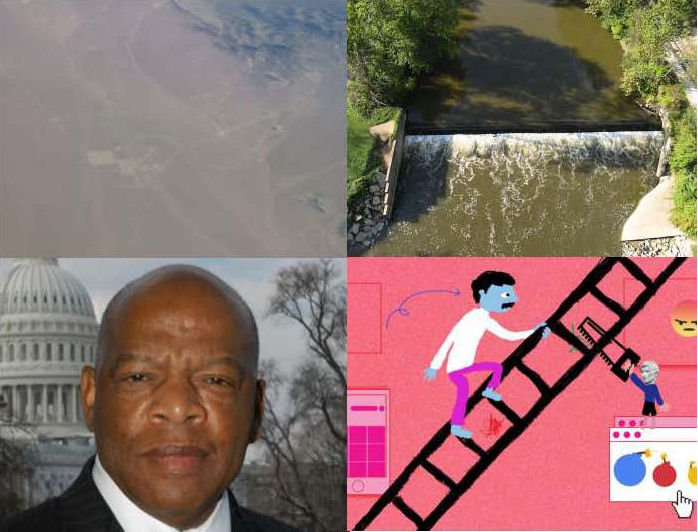 Nevada Test Site, Wikimedia/Ken Lund; The Cuyahoga River, Wikimedia/Ken Lund; Social problems caused by bad design choices within social media, Wikimedia/ Juliana Castro for an article by Juan Ortiz Freuler; John Lewis, Wikimedia/U.S. House of Representatives.
Nevada Test Site, Wikimedia/Ken Lund; The Cuyahoga River, Wikimedia/Ken Lund; Social problems caused by bad design choices within social media, Wikimedia/ Juliana Castro for an article by Juan Ortiz Freuler; John Lewis, Wikimedia/U.S. House of Representatives. During the 1960s, many engineers and scientists became concerned about the trajectory of the technological society they were helping to create [1]. Those years were full of headlines about nuclear war, environmental pollution, unsafe products, ethical lapses in industry and government, and unintended consequences of innovations. The social implications of technology became an organizational focus for IEEE on June 24, 1972, following a vote of the IEEE Technical Activities Board (TAB) [2]. Initially called the IEEE TAB Committee on Social Implications of Technology, this entity in 1982 became the IEEE Society on Social Implications of Technology (SSIT) [3]. Since then, SSIT has established a vibrant community with conferences, publications, standards, awards, and many other activities.
During the 1960s, many engineers and scientists became concerned about the trajectory of the technological society they were helping to create.
The concerns about our technological society have not abated during this half century, although they have shifted. Information-age issues such as loss of privacy, cyber-insecurity, and social media manipulation share the headlines with the founders’ long-standing concerns, quaintly called “traditional SSIT topics” at our annual conference.
The concerns about our technological society have not abated during this half century, although they have shifted.
Since that TAB vote a half-century ago, one thing that has changed significantly is SSIT. We represent a wider array of world regions, ethnicities, genders, and disciplines than our founders encompassed. We have been able to bring together scholars and practitioners with expertise in the social sciences, humanities, law, and public policy, to work closely with IEEE’s traditional engineers and scientists. Our publications, conferences, and social media presence give us a wider reach than the founders enjoyed—take a look at the typewritten newsletters from 1972 to get a sense of how far we have come [4].
If you read those old newsletters closely, however, you will see that humanity continues struggling to make the world a better place. The newsletters from 1972 discuss similar concerns, with a similarly dour tone, as we do today. We have so much to do!
Information-age issues such as loss of privacy, cyber-insecurity, and social media manipulation share the headlines with the founders’ long-standing concerns.
A few months before he died, the American civil rights leader, John Lewis, famously exhorted those attending the 2020 anniversary of the Selma civil rights marches of 1965 to “speak up, speak out, get in the way,” and be willing to “get in good trouble, necessary trouble,” to encourage valued changes [5].
SSIT members have a history of getting into “good trouble” as they encourage IEEE toward more humanistic stances on ethics, transparency, sustainability, and global equity.
SSIT members have a history of getting into “good trouble” as they encourage IEEE toward more humanistic stances on ethics, transparency, sustainability, and global equity. We have recognized the heroism of whistle blowers through our Barus Award, persuaded IEEE leaders to internalize ethical concerns and humanitarian technology goals, and bravely published research articles on taboo topics.
This 50th anniversary year is a good time to ask how the tradition might continue. Are we done? Has the social implications of technology become just another academic field? Or should we develop position articles and policy briefs that try to influence government policies? Should our new education committee create a “current debates in social implications of technology” reader for undergraduate students? Should we organize special sessions at regular technology conferences on the unintended consequences of proposed innovations? What else?
Let us know. “Speak up,” as Lewis would say. I hope you will join us in making our 50th anniversary memorable.
Author Information
Clinton J. Andrews is the President of the IEEE Society on Social Implications of Technology. He is a Professor and the Associate Dean for Research with the Edward J. Bloustein School of Planning and Public Policy, Rutgers University, New Brunswick, NJ, USA.
_____
To view the original version of this article in IEEE Technology and Society Magazine, March 2022, click HERE.






 JOIN SSIT
JOIN SSIT